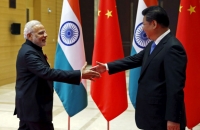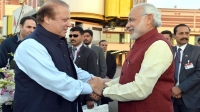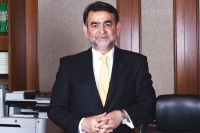pakistan: Banks enjoy unprecedented expansion over past two years
2016/01/16

Pakistan’s economy is fuelling growth across sectors, with its financial sector providing numerous opportunities for global investors
Pakistan’s revival in fortunes since the election of Prime Minister Nawaz Sharif has seen the country’s economy enjoy surging growth since 2013, with a multitude of opportunities for foreign investors now emerging.
Few sectors better highlight this than the country’s financial industries, which have enjoyed unprecedented expansion during the past two years. Profits are up and demand for services is growing, with the country’s population increasingly looking for banking services where previously they had not.
Recent figures clearly indicate the potential of the Pakistani banking sector, with companies such as Habib Bank Limited (HBL) recording six-monthly profits of PKR 16.9 billion ($162 million) in the first half of 2015, up nearly 25% on the same period last year. Elsewhere United Bank Limited (UBL) has enjoyed consistent growth and Mr. Wajahat Husain, the firm’s President and CEO, says his company’s success reflects that of the sector – and the country – as a whole.
“UBL is the second largest private sector bank in Pakistan, and if you were to follow its progress, it would tell you the story of how the banking sector has performed, in spite of the economic challenges,” he says.
Overcoming those challenges have helped to turn around Pakistan’s fortunes and delivered confidence to the market. Importantly, it is not just domestic optimism either – international investors are increasingly bullish about the potential for Pakistan’s banking sector and of the 21 locally incorporated private banks, foreign investors are the majority shareholders in more than 15. It’s a similar environment with the 10 microfinance banks, with 5 entities owned by
foreign shareholdings.
Part of the reason for this has been because of the capital requirements introduced by Pakistan’s government, designed to ensure a stable and well regulated banking sector. The result has been that no sector, other than oil and gas exploration, has attracted as much foreign direct investment as the financial sector over recent years and deals such as the sale of the government’s HBL stake in April 2015 marked Pakistan’s largest ever capital market transaction. With $1.02bn raised, and $764m from foreign investment, both local and international investors have shown confidence in HBL’s future.
Similar arrangements have seen the Pakistani government sell its stake in UBL, something Mr. Zameer Choudrey, UBL director, described as a “resounding vote of confidence” in the company. Other firms, such as National Bank of Pakistan (NBP) have also enjoyed growth and its president, Mr. Syed Ahmed Iqbal Ashraf, says its success has come off the back of focused efforts on improving banking possibilities on a domestic and international stage.
“National Bank has always been a flag bearer for Pakistan at national as well as international forums,” he says. “We act as the commercial arm of the State Bank of Pakistan, so all the revenues that the government collects are collected by the NBP and given to State Bank or the Ministry of Finance. Then whenever our country needs financial expertise, we are always there. We work for the sake of business and national interest.”
Sirajuddin Aziz, President, Habib Metropolitan BankBank
Syed Ahmed Iqbal Ashraf, President, National Bank of Pakistan
Indeed both on the international and domestic fronts, opportunities are emerging for Pakistan’s financial sector. Foreign direct investment has also been ratcheted up to record levels but with the possibilities for extensive growth across growing sectors of the economy, further inflows – especially from the US – are likely.
“Since the mid-fifties, the US has been consistently involved in investment within Pakistan and understands Pakistan’s terrain, people, logic and even the political system better than any other trade or business partner,” says HMB president Mr. Aziz.
“I would say it is much easier for US investors to come in and invest money here. Infrastructure development offers many attractive opportunities; there are many listed companies looking to be linked up to a major American firm. The energy sector, especially oil and gas exploration, also has great business potential here. Pakistan has been blessed with natural resources and American expertise regarding the related industries would be very welcomed.”
UBL is also eyeing up opportunities as the amount of investment coming into the country for sectors such as oil, gas, and infrastructure, increase. Mr. Husain says the ability of UBL “to contribute in terms of investments coming into Pakistan is of the top drawer and we are the best equipped to support any such initiative.”
HMB is also preparing for further growth and Mr. Aziz says his company has been forging relationships with global operators to provide a more international service. “Looking at the trade flows and trade patterns of Pakistan we have been able to create strategic and strong relationships with other financial institutions intermediating international trade, to help our clients do business worldwide.”
Certainly Pakistan’s outlook has undergone a remarkable transformation over the past 24 months and its changing economic fortunes are now being reflected by ratings agencies and investor sentiment. The IMF program is widely seen to be on track and Moody’s has upgraded the country’s credit rating by a notch and assigned a stable outlook.
“Fortunately, these positive developments and improving business sentiments have created much needed room for the policy makers to focus on a comprehensive reform and growth strategy,” adds Mr. Ashraf Mahmood Wathra, governor of State Bank of Pakistan.
He is now focused on maintaining stability and “unleashing the growth potential” by dealing with structural rigidities, including the privatization of loss making PSEs, increasing tax revenues and attracting further investment.
This is being aided by an improved security situation and the creation of the China-Pakistan Economic Corridor, while historically low interest rates are also encouraging FDI inflows. Japanese investors are moving into automobiles and coal-based energy projects while Russian and Korean firms are exploring infrastructure and energy sectors. And Mr. Wathra is clear that investors are only just scratching the surface of Pakistan’s potential.
“This country offers immense potential due to a large domestic market, as well as its geographical location that provides a gateway to central Asian countries,” he adds. “With an improved security situation and a more comfortable external account, foreign investors are now tracking Pakistan. And why not?”
- Related Articles

Climate change laws around the world
2017/05/14 There has been a 20-fold increase in the number of global climate change laws since 1997, according to the most comprehensive database of relevant policy and legislation. The database, produced by the Grantham Research Institute on Climate Change and the Environment and the Sabin Center on Climate Change Law, includes more than 1,200 relevant policies across 164 countries, which account for 95% of global greenhouse gas emissions.
Asia Economic Roundup: July 2016
2016/07/18 Without a doubt Britain’s decision to abandon the European project will be remembered globally as a wake-up call for political elites around the world. It seems the people chose to go against immediate economic interest and accept an extra financial turmoil in order to address deeply seated social and identity issues. Although Asia’s exposure to the UK is relatively limited and this is not exactly a “Lehman Moment”, nonetheless we can expect a lively debate as policymakers in Asia look for an appropriate response to address the needs of vulnerable households.
Pakistan's Prime Minister Nawaz Sharif meets India's Premier Narendra Modi.
2016/01/03 On his flight back home from Kabul, Prime Minister Modi broke the journey at Lahore. This unusual drop off has become a subject for speculation. A Congress spokesman has said that the Indian country will have to pay heavily for the tea Modi had with Pakistan premier Nawaz Sharif at his family residence in Raiwaind.
Pakistan's Economic Recovery Robust earnings and high solvency for big time banking players
2015/12/14 As Pakistan’s economy gets back up to speed, the banking sector will continue to play a leading part in its recovery. In three years, the total price of assets held by the banking system has climbed from $116 billion to $147 billion Alittle additional than two years next the initial-ever handover from one civilian government to an extra, the numbers coming out of the macroeconomic cruncher are confirming that Pakistan is back on course to sustainable increase. Business-friendly policies and reforms initiated by Prime Minister Nawaz Sharif’s government have led some to compare Pakistan with Colombia as champions in the economic turnaround category, citing their stable governments, market-oriented reforms and manageable security situations.
- pakistan News
-
- PAKISTAN: Pakistan's election body asks police to arrest, produce Imran Khan
- AFGHANISTAN: UNWTO: International tourism – strongest half-year results since 2010
- PAKISTAN: Qatar launches new direct sea route to Pakistan
- PAKISTAN: Erdogan congratulates Pakistan on Independence Day, vowing to strengthen friendly ties
- PAKISTAN: China congratulates Pakistan's new prime minister
- CHINA: China, Pakistan vow to further deepen bilateral pragmatic cooperation
- Trending Articles
-
- CHINA: China welcomes Guinea to take part in Belt and Road Initiative
- CAMEROON: Poor End of Year Results for Cameroon Students
- AUSTRALIA: Queensland Bauxite Gains State Approval of Mineral Development Work Program
- KENYA: Kenya to hold fresh presidential election on October 17
- UGANDA: Ugandan Govt Starts Verifying International Academy Teachers
- CANADA: NAFTA renegotiation could be double-edged sword











